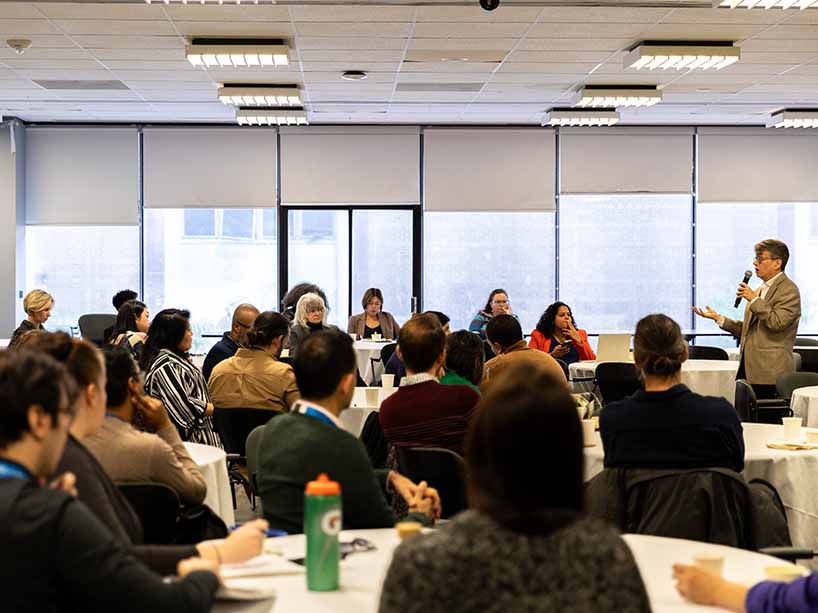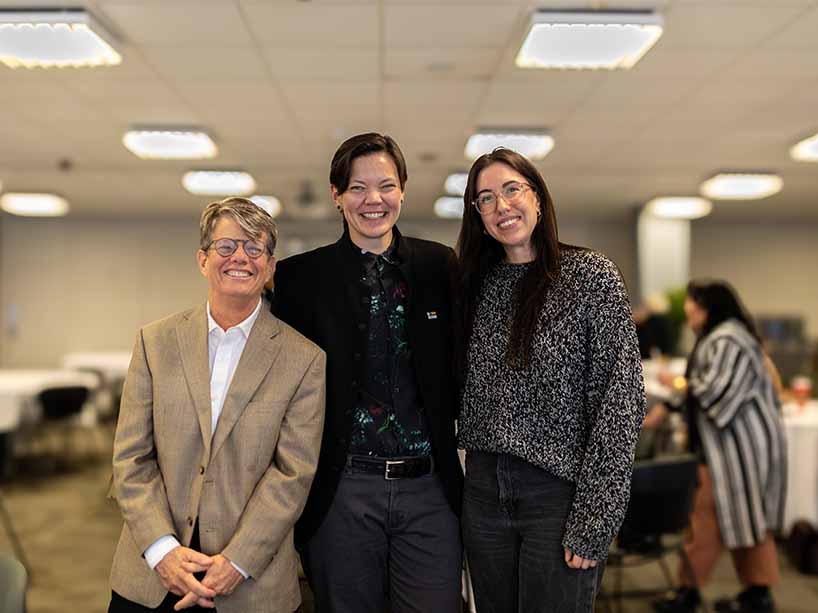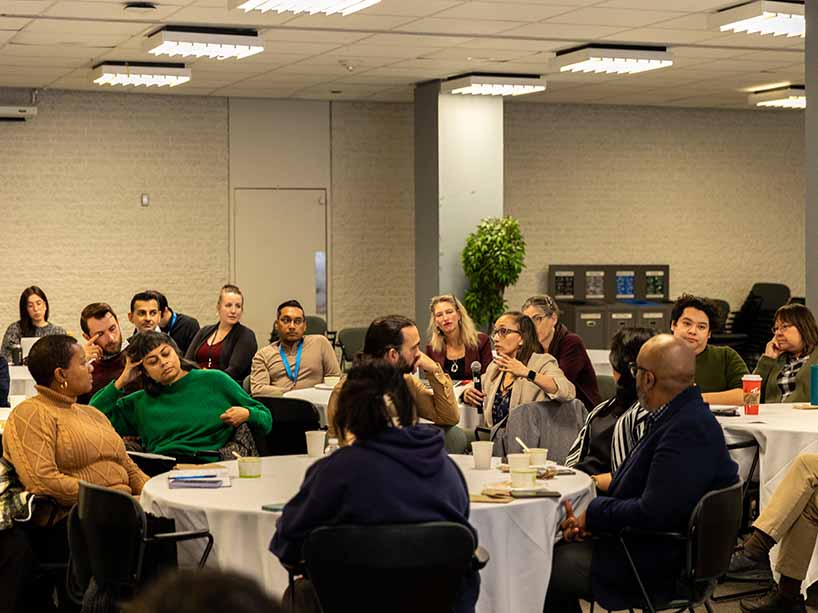Next steps for including Indigenous content in student learning

Jennifer Simpson, far right, special advisor to the president, equity, diversity, inclusion and decolonization (curriculum transformation), addresses community members at a recent meeting to discuss recommendation nine from the Standing Strong Task Force. (Photo: Nicholas Paddison)
Members of the TMU community recently gathered to discuss a recent report on ways to integrate learning about Indigenous history and Indigenous and colonial relations into academic programs.
The event focused on recommendation nine of the (PDF file) Standing Strong Task Force (SSTF) report, released in Aug. 2021. The SSTF report recommended that the university develop a plan to ensure all academic programs contain mandatory learning opportunities about Indigenous history and Indigenous and colonial relations for all students.
Held in Jorgenson Hall, the hour-long forum was open to all community members and was led by Jennifer Simpson, special advisor to the president, equity, diversity, inclusion and decolonization (curriculum transformation). She recently released the Equity, Diversity, Inclusion and Decolonization (Curriculum Transformation), Summer 2023 Report, which outlines the university’s vision for carrying out recommendation nine.
"I am so proud of the opportunity to help lead this important change - change that is long term, systemic and faculty driven - and grateful to all of our community members for coming together to begin to pave our way forward,” Simpson said.
Also at the event was Tanya De Mello, vice-president, equity, and community inclusion, and Sean Kheraj, vice-provost academic, along with various community members from across the university.
Simpson opened the event with a land acknowledgement, noting that it “offers a moment to pause, breathe and say, ‘What are we doing here?’ I think it offers the chance to reflect on our own positionality, what we bring to this work, what our commitments are, what we hope for,” she said.
“I come as a white person and a settler who has long worked on equity and who still has a great deal to learn. I have really valued the opportunity to serve in this role. I think reflecting on positionality and location allows us to attend to our heads, our hearts, and our bodies– and be checked in with those, both over time and in this particular moment,” she said.
De Mello also addressed attendees, noting she was proud of the university’s commitment to lead the way in this endeavour.
Leading the way
“We want to be at the front of it. You can lead and you can do so in a beautiful way and have the people who are from these communities feel honoured, or we can do it because everyone’s doing it and it becomes a mandatory part of the way university education goes,” she said. “We want to be at the leadership level and at the level where people say our voices were heard, we were part of it, and it was done in a meaningful, thoughtful, respectful way.”
She also emphasized the importance of ensuring the entire community worked together.
“One of the things I think is so powerful in Jennifer’s undertaking, is to work with our Indigenous community members faculty and staff, our Black faculty and staff, and all of our members that see this as a key priority and those who don't but are willing to engage, and determine together the ways in which we can move the work forward,” she said.

Jennifer Simpson, special advisor to the president, equity, diversity, inclusion and decolonization (curriculum transformation), left, with Rachel DiSaia, associate director, Next Chapter implementation and coordination, centre, and Brittany Szczyglowski, Research Assistant, Next Chapter. (Photo: Nicholas Paddison)
The curriculum transformation report by Simpson addresses the national and provincial contexts for Indigenous content and equity outcomes at post-secondary institutions. It outlines ongoing initiatives at TMU, as well as central themes that emerged from a series of broad and targeted engagement meetings about recommendation nine this past spring. Finally, the report offers next steps for TMU programs and faculties to consider.
The report says that through shaping degree requirements and pathways, faculty members and universities have an opportunity to offer programs in which students develop capacities that are informed by their disciplines and by what is required to recognize inequity and contribute to equity in their chosen professions and communities.
It explains that change that attends to both disciplinary and equity-related outcomes will necessarily be faculty- and program-driven. Ideally, it will also be systemic.
Questions welcomed
The event served as an opportunity for community members to come together to ask questions, express any concerns they might have, and discuss the upcoming curricular transformation.
One community member asked for clarity about the term “mandatory learning opportunities”. Simpson explained that this referred to requirements to Indigenize the curriculum, but that faculties and departments have the flexibility to choose what those opportunities would be for their respective units.
“One size fits all is not going to work here, we recognize that. Individual programs will define the way forward,” Simpson said. “What’s important is that it’s systemic and long-term.”

All community members at the meeting to discuss Recommendation Nine had the opportunity to ask questions and voice any concerns. (Photo: Nicholas Paddison)
Another community member highlighted the importance of ensuring that the efforts to implement recommendation nine are shared across the entire university community, and would not fall solely on the shoulders of Indigenous faculty and staf
Others commented on the importance of having adequate resources to implement the changes, and how TMU’s Centre for Excellence in Learning and Teaching could be of support in the process.
A student also remarked that it was important for students to be able to implement their learnings in practical ways.
“The goal is to be part of the decolonization process. This is a shared responsibility among all of us, not just Indigenous people,” she said.
Related stories:
